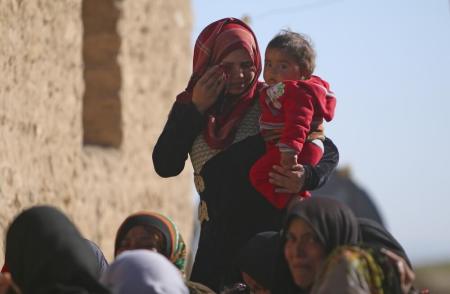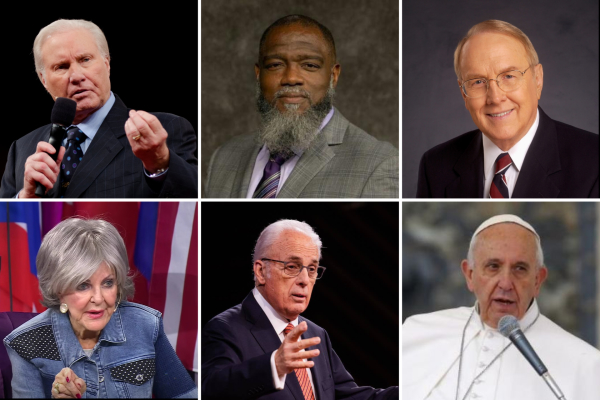Will President Obama Refuse to Recognize Genocide of Middle Eastern Christians?

GENOCIDAL INTENT
The State Department also insists that it lacks statements of intent from ISIS to violently eradicate the Christian minority "in whole or in part." Under the Genocide Convention, such statements are required for the designation "genocide."
But ISIS's propaganda videos and magazine Dabiq offer many such statements. One such source trumpets the vow to "break your crosses and enslave your women," underscored with a photo of the black flag instead of a cross atop St. Peter's Basilica at the Vatican. Most Iraqi Christians are from the Chaldean and Syriac Catholic Churches, which are in unity with Rome, and so that statement can be interpreted literally as intent to destroy their communities as well as Christians generally.
The U.N. special adviser on the prevention of genocide lists patterns of action whose "cumulative effect" can evidence genocidal intent: "displacement," "practices to complete the exclusion of targeted group from social/political life," "atrocities," "the destruction of or attacks on cultural and religious property and symbols . . . to annihilate the historic presence of the group," etc. These Christians can check off the entire list.
Intent in the 1995 genocide case against Bosnian Muslims in Srebrenica was found in the political goals of the attacking Serbs. Without Srebrenica, the Serbs would see their sought-for state divided in two. Similarly, without Nineveh, which sits between the ISIS cities of Raqqa and Mosul and which was home to most Iraqi Christians and Yazidis, ISIS's caliphate would be divided. As the Bosnia genocide court found, the elimination of the Muslims in Srebrenica "would have accomplished the goal of purifying the entire region of the Muslim population." ISIS "purified" Nineveh of Christians and Yazidis. It is difficult not to conclude that the reason for the administration's reluctance to designate a Christian genocide is not for lack of evidence but for political reasons.
In a December 4 letter to Secretary Kerry, 30 distinguished Christian leaders, religious-freedom advocates, and Near East scholars, from an array of churches and political backgrounds, aware of Department claims that it lacked evidence that the persecution of Christians in the region constitutes genocide, requested an opportunity to brief him "on the continuing religious genocide confronting both vulnerable Christian and Yazidi minorities of Iraq and Syria." Their request for a meeting has not been granted.
POLITICAL CONSEQUENCES
It is difficult not to conclude that the reason for the administration's reluctance to designate a Christian genocide is not for lack of evidence but for political reasons.
One possible obstacle is the Genocide Convention's requirement that states act to "prevent and protect" the victims of genocide. During the Clinton administration, that proved a deterrent to declaring genocide in Rwanda and south Sudan. Ironically, the Obama administration's national-security adviser and U.N. ambassador had been prominent critics of that silence.
According to The Economist, some fear that such a designation would compel the U.S. to commit to greater military involvement, and "by no means all Middle Eastern Christians are convinced that a storming intervention by Western powers is the right thing to save their communities." In any event, the U.S. military is already active against ISIS.
On the record, David Saperstein, the State Department's ambassador for international religious freedom, argues that a genocide designation would not make a difference in the U.S. response and, he thus implies, it is just not that important a concern: "We are doing what we would have done regardless of whether the designation had been made or not."
But might there be another political reason at the root of the administration's reluctance to recognize this Islamist genocide of Christians?
Consider how it would parallel the reason that Holocaust scholars have found for President Roosevelt's silence about the genocide of Jews in the Holocaust: "Nazi propaganda, which portrayed the Allied involvement in the war as being on behalf of 'the Jews,'" led him instead to "refer in general to the aim of ending the mistreatment and murder of civilians under Axis rule."
That silence proved devastating for European Jews and came to be seen as a historic moral failing. From that experience emerged the solemn vow "Never again." In the face of ISIS's anti-"Crusader" propaganda, might the Obama administration be on the verge of making that same mistake, of silence, over the genocide of Christians?
Whether the official U.S. list of genocide victims includes or excludes Christians will affect the persecuted Christians enormously: in raising humanitarian aid, receiving asylum, overcoming de facto discrimination in U.N. resettlement programs, receiving restitution and reparation for seized land, and securing a place at the peace-negotiations table. It would also give these two-millennia-old Christian communities a sense of justice — something that still matters greatly to the families of Holocaust victims and that eludes the Armenian community.
Originally posted at nationalreview.com





















